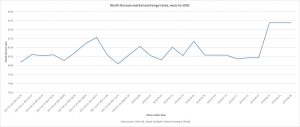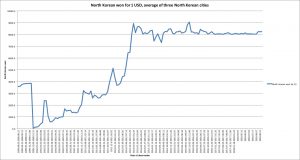By Benjamin Katzeff Silberstein
Has North Korea’s economy been growing under sanctions? That’s what an economist in Pyongyang claims. In a recent interview with Kyodo (published here by Japan Times), Ri Gi Song at Pyongyang’s Institute of Economics at the Academy of Social Sciences, claimed that North Korea’s GDP per capita grew by 3.7 percent in 2017, a year during which the country was virtually banned from selling its most crucial export goods, and faced very harsh conditions for importing crucial resources such as oil and fuel. When factoring in population growth, the GDP-growth-figure diminishes somewhat to 3.2% (see below), but it’s still firmly in the same range.
Strange as it may sound, it is possible to imagine that North Korea’s economy wouldn’t contract severely during a year of sanctions. GDP growth alone is a poor way of measuring long-run, sustained economic growth and progress. While it may sound counter-intuitive, the sanctions, while depressing the economy in certain ways, may have boosted it through other mechanisms. The ban on coal imports from North Korea, for example, may well have boosted certain industries, as this blog has covered in the past. Because exports have dwindled drastically, the price at which North Korean coal can sell – domestically as well as internationally – gets much, much lower than when it could be sold in greater quantities on a somewhat competitive market. So with lower prices for factors of production, industry could certainly experience growth in the short-run. But this would only be a temporary and meaningless boost, since the losses from unsold goods abroad would be much greater.
In other words, Ri may be partially right, but numbers are also likely inflated for political reasons. Here’s an excerpt from the interview, annotated with comments:
North Korea’s economy grew 3.7 percent in 2017, a professor of a think tank in Pyongyang said in brushing aside the view that the country has faced an economic contraction against a backdrop of international sanctions.
Even though North Korean economic data has become somewhat more public and plentiful in the past few years, there are still undeniable political imperatives in publishing data that makes the country appear resilient in the face of sanctions. After all, if sanctions aren’t “working” (whatever that may mean), what’s the point in keeping them? That, of course, doesn’t mean that such figures are accurate, wholly or partially.
Ri Gi Song, a professor of the Institute of Economics at the Academy of Social Sciences, said in a recent interview with Kyodo News that North Korea has achieved economic expansion without depending on other nations.
Well, he would say that, since that is how Juche is spoken. That doesn’t mean it comes from a place of literal belief; it’s simply what you say if you’re a North Korean economist speaking from your official position, and shouldn’t be read as an expression of delusion or the like.
Ri said gross domestic product totaled $30.70 billion in 2017, up from $29.60 billion in 2016. It is very rare for North Korea to disclose its GDP and also the first time that the country’s GDP data in the past two years have been unveiled.
But it is impossible to verify the accuracy of the figures, as the professor did not make public other economic indicators such as consumer spending, investment and inflation rate.
Although a report released by South Korea’s central bank showed in July that the North’s economy shrank 3.5 percent in 2017 from the previous year, Ri shrugged it off, saying Seoul’s calculation is “only an estimation.”
Ri is right that South Korea’s figures are only estimates, albeit careful ones based on models developed and refined (presumably) through years of experience. But the thing is, Ri’s official North Korean figures, too, are only an estimate. Even in the best of situations, no GDP-figure is exactly certain and precise. To calculate as vast of an “object” as a country’s economy, some assumptions inevitably have to be made. One of them is that various forms of reporting is generally accurate.
In the case of North Korea, however, this problem is incomparably worse than in open, democratic free market-economies. Let’s assume for a moment that the North Korean government genuinely is eager and willing to generate real, trustworthy and truthful economic statistics, which in many ways does seem to be the case. Even so, how do you generate accurate accounts reporting in an environment when the going principle for a long time has been that planning targets must be met regardless of actual conditions? And with so many different forms and models of enterprise in action throughout the country, seemingly with little but perhaps improving consistency across the board, how would it be reasonable to expect the North Korean government to be able to calculate a reasonable GDP-figure? That’s not even getting started on the investments-portion, a crucial variable to determine growth. Private investments into partially private enterprises is still technically illegal in North Korea, but there are many signs to suggest that it’s taking place on an increasingly substantive scale.
So, even if the North Korean government’s statistical authorities have all the right intentions, I don’t envy their working conditions one bit.
He said North Korea’s population grew to 25,287,000 last year from 25,159,000 in 2016. Based on the figures, the country’s per capita GDP stood at $1,214 last year, equivalent to that of Myanmar.
This means that the actual growth rate claimed by Ri, factoring in population growth, is 3.2%. This, however, still isn’t the “real” growth rate. To get those numbers, we’d need to factor in inflation, and no reliable numbers are available to let us do that. But on the face of it, judging by the price trends for foreign currency and rice through 2016–2017, inflation wasn’t visibly large or out of the ordinary. Even so, we simply don’t know.
In an attempt to overcome the negative impact of international economic sanctions, North Korea has “developed various technologies” under the spirit of “self-reliance,” Ri said, adding the nation has implemented measures to save the utilization of crude oil, for example.
This is certainly true to an extent. Just look at the masses of North Koreans purchasing solar panels for electricity rather than relying on scantly available government supplies of power. And as mentioned above, there is some sense in this argument, if interpreted in a slightly broader manner, that North Korea’s economy may have experienced some gains in efficiency from sanctions, as people are forced to find new, creative ways to get around increasingly tricky conditions. And industry may have gotten a boost from lower energy prices, as may other consumption, since citizens can theoretically spend more on other items if energy prices fall.
Still, this boost would only be marginal, and temporary at best. It certainly wouldn’t create 3.2 percent growth rates, although it might have contributed.
[…]
Ri acknowledged that North Korea has suffered food shortages, but emphasized that the heavy and light industries as well as the chemical sector have been growing and electric power conditions have been improving.
Amid a thaw in inter-Korean relations, Ri expressed hope for economic cooperation with the South.
Full article:
North Korea’s economy grew 3.7% in 2017, Pyongyang professor estimates
Japan Times/Kyodo
2018-10-13
At the end of the day, as Andray Abrahamian points out, neither North nor South Korea publishes their methodology for calculating North Korea’s growth rates, so all we can do is speculate about the assumptions that go into the models.


